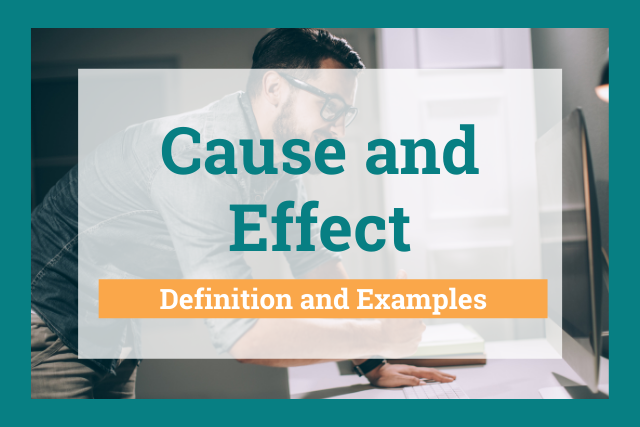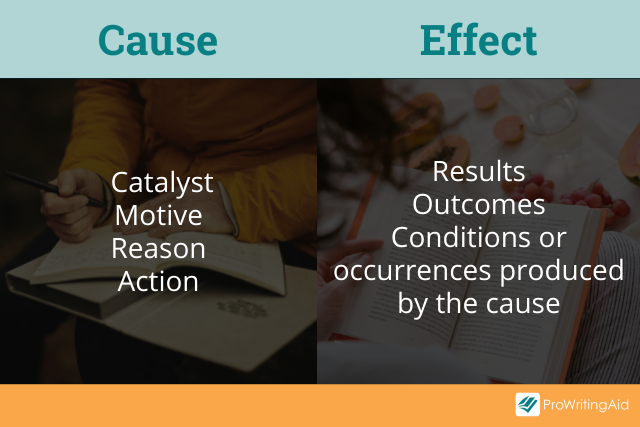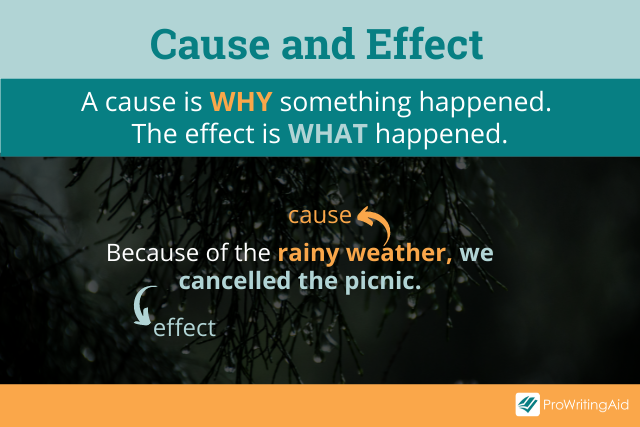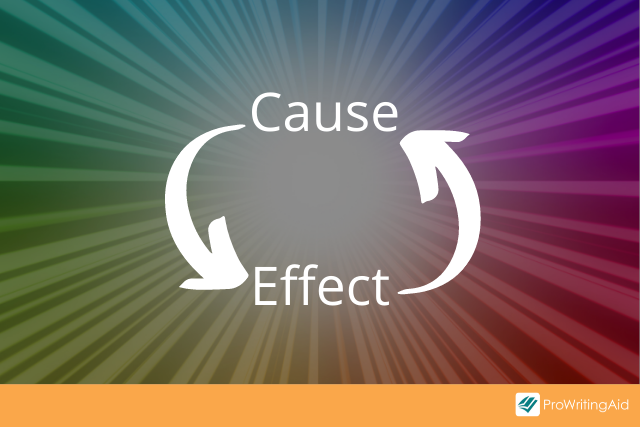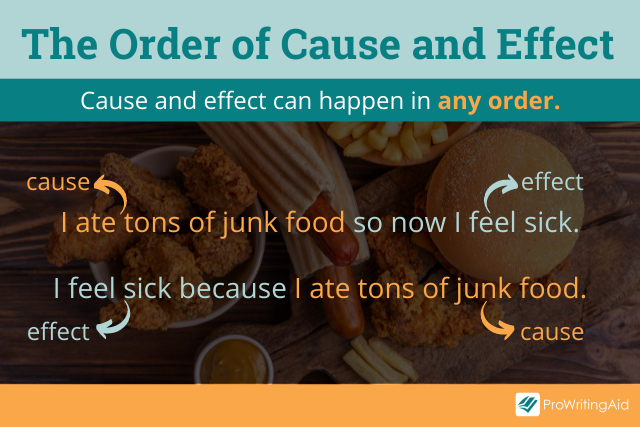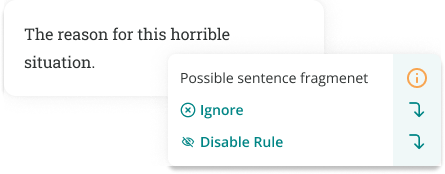Table Of Contents:
- Because, since, as, and so
- Consequently and therefore
- Cause and effect words that are followed by nouns
- ‘So… that’ and ‘Such… that’
Linking words help us to connect ideas and sentences. We can use linking words to give examples, add and order information, summarize, give a reason or result, or to contrast ideas.
Sometimes we need to link two ideas in a way that shows a cause and effect relationship between them.
Look at the following example:
- I was late to work today because I missed the bus.
The first part of the sentence, ‘I was late to work today’, tells us what happened. The second part of the sentence, ‘because I missed the bus’, tells us why it happened.
The linking word ‘because’ in this sentence shows cause and effect. The cause is WHY it happens. The effect is WHAT happens.
Because, since, as, and so
Let’s look more closely at some cause and effect linking words. Some common cause and effect linking words are ‘because’, ‘since’, ‘as’ and ‘so’.
‘Because’, ‘since’, and ‘as’ show cause.
- It game was cancelled because it was raining.
‘Because it was raining’ is the cause. It is why the game was cancelled.
Here are a few more examples.
- I took notes for you in class today since you were absent.
- As Monday is a holiday, we have decided to leave town for the weekend.
‘So’, on the other hand, shows effect.
- It was raining, so the game was cancelled.
This is almost the same as the earlier sentence, but we use the word ‘so’ to talk about the effect: the game was cancelled.
Consequently and therefore
Some other words we can use to talk about effect are ‘therefore’ and ‘consequently’.
- Jesse’s new girlfriend was allergic to cats. Therefore, he had to give his beloved cat Fluffy away.
- He stole money from the company, and consequently, he was fired.
‘So’, on the other hand, cannot start a new sentence and does not need any words before it.
Cause and effect words that are followed by nouns
‘Because of’, ‘due to’, and ‘owing to’ are linking words that also show cause, but they must be followed by a noun instead of a verb phrase.
- The game was cancelled because of the rain.
Here, we use a noun, the rain, after the linking words ‘because of’. ‘Due to’ and ‘owing to’ are used the same way.
- We lost the contract due to Edgar’s careless mistakes.
- The business went bankrupt owing to a combination of bad luck and bad decisions.
‘So… that’ and ‘Such… that’
We can also use ‘so + an adjective + that’ to create cause and effect:
- I was so tired that I fell asleep on the bus.
In this sentence, ‘I was tired’ is the cause and ‘I fell asleep on the bus’ is the effect.
We can also use a quantifier and a noun instead of an adjective to create a sentence in the same way:
- Bill Gates earns so much money that he donates most of it to charity.
- He ate so many cookies that he threw up.
We can also use ‘such + an adjective + a noun + that’ to create cause and effect.
- She is such a beautiful woman that everyone she meets falls in love with her.
‘She is a beautiful woman’ is the cause in this sentence; ‘everyone she meets falls in love with her’ is the effect.
- This is such a good recipe that my grandma refuses to share it.
‘This is a good recipe’ is the cause; ‘my grandma refuses to share it’ is the effect.
Here’s a good video from Anglo-Link explaining the types and uses of linking words of cause and effect:
See also:
Coordinating Conjunctions
Conjunctions of Contrast
You may be familiar with the Biblical quote “You reap what you sow.” The things you do are like planted seeds, and those seeds produce a crop which is the result of your actions.
The quote is an example of the cause and effect relationship. Your action, sowing good or bad seeds, produces a reaction, a healthy or rotten harvest.
A cause is an action, and the effect is the resulting reaction.
Definition of Cause and Effect
In the cause and effect relationship, one or more things happen as a result of something else.
A cause is a catalyst, a motive, or an action that brings about a reaction—or reactions. A cause instigates an effect.
An effect is a condition, occurrence, or result generated by one or more causes. Effects are outcomes.
What Does Cause and Effect Mean?
Cause and effect means that things happen because something prompted them to happen.
A cause is why something happens. An effect is what happened.
For example, you have a picnic planned for Sunday afternoon. However, the weather becomes stormy and you have to cancel your outdoor plans.
In this situation, the cause is the stormy weather and the effect of that stormy weather is the picnic cancellation.
Cause and effect are intertwined. American poet Ralph Waldo Emerson said, “Cause and effect are two sides of one fact.”
You can’t have an effect without a cause, nor can you have a cause without an effect.
In cause and effect relationships, there may be multiple causes and multiple effects. The relationship may cycle on with a cause leading to effects that become a cause for more effects!
Let’s say that you oversleep and are late to a meeting and, because you’re late to the meeting, you miss out on the delicious pastries the boss brought in. Since you missed the pastries, you’re hungry and aggravated. This may in turn have an effect on your next interaction with a colleague or client.
Examples of Cause and Effect in Sentences
Cause and effect sentences show a clear, direct relationship between events. They show how one event or action triggers an outcome. They may also show how an effect has more than one cause, or a cause has more than one effect.
Cause and effect sentences can present the cause first and follow it with the effect, or present the effect first and follow it with the cause.
- I ate tons of junk food, so now I feel sick.
- I feel sick because I ate tons of junk food.
These sentences have the same cause and effect presented in a different order. These sentences share the same meaning and show the same relationship.
In the next five sentences, determine which comes first, the cause or the effect.
-
He lied to me, so I ended our relationship.
-
Since I was up all night with my sick child, I’m exhausted this morning.
-
She never gave up on her writing, and now she’s published a book!
-
They could finish the race because they had trained for it so diligently.
-
They gave the restaurant a critical review because their food was burnt to a crisp.
In the first three sentences, the cause comes first. In sentences four and five, the effect comes first.
Cause and Effect Relationship Examples
Cause and effect relationships exist in just about every subject area.
History
We can see the causes of local, national, or global events, and the effects of those events. We can ask, “What were the causes of World War II?” and then “What were the effects of World War II?”
We can examine what caused an economic recession or depression and the effects of that crisis on society.
In these cases, as with many others, there are multiple causes and multiple effects.
Science
In 2020, the world was hit with a global pandemic. Scientists saw the effects of the disease on people’s health and lives and began searching for the cause of the virus.
As the story goes, Sir Isaac Newton observed an effect, an apple falling from a tree. This prompted him to seek the cause of that fall—why did the apple fall down, not sideways or up? His observation of that effect led him to discover the cause: gravity.
When conducting experiments, scientists perform an action (cause) to see what will happen as a result (effect).
Most of us probably had to do an experiment with plants in school. We examined what happened to our two plants (effects) depending on whether we gave or withheld from them proper light and water (cause).
The Natural World
Nature is full of examples of cause and effect.
- Plants grow as a result of the sun’s heat and light.
- Bears hibernate so they can conserve energy and won’t require food during the winter months when food is scarce.
- The moon’s gravitational pull causes the ocean’s tides.
Story
Narrative stories, both fiction and non-fiction, are often driven by cause and effect.
In F. Scott Fitzgerald’s The Great Gatsby, Gatsby bases all of his action on pleasing Daisy because he is obsessed with winning her love.
Daily Life
Our everyday lives are full of cause and effect experiences.
- As a result of studying hard, you aced your test!
- You called in sick because you woke up with a fever.
- You meet friends for drinks because it’s your birthday.
Cause and Effect Words
There are words that signal a cause and effect relationship. These words can help readers recognize the cause and effect structure of a passage, making it easier to comprehend content.
Words that signal a cause include:
| Source | Root | Origin |
|---|---|---|
| Seed | Bring about | Starting Point |
Words that signal effect include:
| Result | Consequence | Upshot |
|---|---|---|
| Outcome | Ramification | Reaction |
Signal Words in Cause and Effect Sentences
Observe how the signal words communicate the relationship in these cause and effect example sentences:
-
As a result of COVID, many high school students couldn’t experience graduation ceremonies.
-
There was a multi-car accident on the highway, so traffic was at a standstill.
-
I’ve started eating a much healthier diet. Consequently, I’ve lost weight and have more energy.
-
Thanks to my caring friends, I recovered from a difficult situation.
-
Since the weather was perfect, we spent the entire day outdoors.
-
My partner got his dream job 200 miles away from where we currently live. As a result, we have to sell the home and move.
-
His financial hardships are due to his careless spending.
-
She campaigned the hardest, therefore she won the vote.
-
The doctor’s optimism is the reason for our positive outlook.
-
Your sister is several years older than you. Accordingly, she has more responsibility and independence.
TIP: Observe the sentences that start with cause signal words (As a result, Thanks to, Since). There are two clauses in those sentences and they are connected by a comma.
The first clause is dependent meaning that it must be attached to an independent clause to make sense. When left alone, dependent clauses can become sentence fragments which are grammatically incorrect.
ProWritingAid is a thorough grammar checker that will alert you to any fragments and make suggestions for revision.
A Final Word on Cause and Effect
A cause and effect relationship is one in which an event generates an outcome. We see these relationships everywhere: from history to science to nature to literature to daily life!
When you’re reading or writing about cause and effect, look for or use signal words that make the relationship between the event (cause) and the outcome (effect) clear.
Take your writing to the next level:
20 Editing Tips from Professional Writers
Whether you are writing a novel, essay, article, or email, good writing is an essential part of communicating your ideas.
This guide contains the 20 most important writing tips and techniques from a wide range of professional writers.

Asked by: Callie Dach Sr.
Score: 4.5/5
(67 votes)
Effect is defined as what happened. Cause is defined as why something happened. Clue words that signal causal relationships include: such as, because, so, consequently, therefore, thus, and since.
What are some words for cause and effect?
Cause-and-Effect Linking Words
- Conjunctions. The most important conjunctions are because, as, since, and so. “ …
- Transitions. The most important transitions are therefore, consequently, and as a result. …
- Prepositions. The most important prepositions are due to and because of.
What are some effects words?
Synonyms & Antonyms of effect
- aftereffect,
- aftermath,
- backwash,
- child,
- conclusion,
- consequence,
- corollary,
- development,
What is cause and effect?
Things happen for a reason: there is a cause for every effect. In science, the cause explains why something happens. The effect is the description of what happened.
How do you identify cause and effect?
In essence, cause is the thing that makes other things happen. Effect refers to what results. It is the what happened next in the text that results from a preceding cause. To put it concisely, cause is the why something happened and effect is the what happened.
25 related questions found
What are the 5 examples of cause and effect?
Examples of Cause and Effect
- Cause: We received seven inches of rain in four hours. …
- Cause: I never brush my teeth. …
- Cause: I’ve smoked cigarettes daily for 20 years. …
- Cause: Many buffalo were killed. …
- Cause: The streets were snow-packed and icy. …
- Cause: He broke his arm. …
- Cause: The boss was busy.
What is cause and effect meaning example?
Cause and effect is the relationship between two things when one thing makes something else happen. For example, if we eat too much food and do not exercise, we gain weight. Eating food without exercising is the “cause;” weight gain is the “effect.” There may be multiple causes and multiple effects.
How do you explain cause and effect to a child?
In a cause and effect relationship, one event causes another to happen. The cause is why it happened, and the effect is what happened. You can look for signal words to identify cause and effect in text.
How do you write a cause and effect sentence?
There are two basic types of cause and effect sentences:
- 1) You start with a CAUSE, then connect it to an EFFECT with a CONJUNCTION.
- 2) You start with an EFFECT, then connect it to a CAUSE with a CONJUNCTION. …
- 3) You start with a CONJUNCTION, then follow it with a CAUSE, comma, and an EFFECT.
What is a cause and effect paragraph?
In composition, cause and effect is a method of paragraph or essay development in which a writer analyzes the reasons for—and/or the consequences of—an action, event, or decision. A cause-and-effect paragraph or essay can be organized in various ways.
What are some examples of affect?
A few example sentences using the word “affect” are:
- Verb: She must have affected them to get that kind of emotional response.
- Verb: He affects an air of superiority when he enters a room.
- Noun: His facial expressions were diminished and presented a flat affect.
What qualifies as an effect?
noun. something that is produced by an agency or cause; result; consequence: Exposure to the sun had the effect of toughening his skin. power to produce results; efficacy; force; influence: His protest had no effect.
What is an example of affect?
Affect is usually a verb. Simply put, affect means to impact on or influence. For example, “The snow affected the traffic.”
How do you start a cause and effect paragraph?
Parts of the cause and effect paragraph should be like in the following:
- Topic sentence.
- Causes (at least 2)
- Transition sentence.
- Effects (at least 2)
- Conclusion.
What type of research is cause and effect?
A controlled experiment is the only research method that can establish a cause and effect relationship.
What are the three parts of a cause and effect paragraph?
The Cause and Effect Essay has three main parts: introduction, body and conclusion.
What is different between affect and effect?
Affect is a verb – “to affect” – meaning to influence or have an impact on something. Effect is the noun – “an effect (a positive or a negative effect) is the result of being affected by something. There is also a verb “to effect”, which means to bring something about – “to effect a change”.
What is the sentence of effect?
«Smoking has a harmful effect on your health.» «His argument had the opposite effect on them.» «This plan will have a lasting effect on the community.» «The music had a calming effect on the babies.»
How do you use effect?
Effect is most commonly used as a noun, meaning “result” or “consequence.” So, when you’re writing, try to swap out effect for result and see if it makes sense. For example, His sunburn was an effect of exposure to the sun. His sunburn was a result of exposure to the sun.
How do you describe effect?
1 : an event, condition, or state of affairs that is produced by a cause : influence Computers have had an important effect on the way people work. 2 : the act of making a certain impression The tears were only for effect. 3 : execution sense 2, operation The law goes into effect today.
What is effect in literature?
Causation, or cause and effect, is simply an action with a reaction. When an event occurs, its effect impacts the course of the story, often changing the character or later events of a story dramatically. Cause and effect are also very important to plot, moving the action forward.
What is the meaning of effect in research?
In education research, the term “effect” usually refers to an estimate from a model, such as a regression. For example, I might want to see how education influences income, but, in order to isolate this relationship, I need to control for other factors that also affect income, such as industry and experience.
Are you affected or effected by something?
Affected can be used as a past tense verb that means influenced or changed. It can also be used as an adjective to refer to a noun that has been affected (the affected body part). Effected is a past tense verb that means brought about or achieved. It’s a very subtle difference from affected.
Did not affect or effect?
Use “affect” as the verb in a sentence when you’re talking about producing change or making a difference. … That list should affect your understanding of the word. In this case, “affect” would mean “improve.” “Effect” is a noun, and it is the outcome of an event or situation that created a change.
In English, linking words help to express cause and effect between different actions or events.
There are three main linking words categories.[1]https://web2.uvcs.uvic.ca/courses/elc/studyzone/570/pulp/hemp5.htm
- Conjunctions
- Prepositions
- Transitions
They can be used with all the different verb tenses in English.
Conjunctions
Conjunctions can be used to both express cause and effect. They
link two complete thoughts together.
The most important linking words for cause are “because” and
“since”.
For example:
- I am going to eat because I am hungry.
- Since it
is late, she is going to sleep.
As you can see, if the conjugation is in the beginning of
the sentence, you must use a comma to separate the two clauses.
The most important linking word for effect is “so”.
For example:
- It was raining outside, so I brought an umbrella.
- They test is tomorrow, so I can’t go out to the party. I must study instead.
As you can see, with the conjunction “so”, you must always
use a comma to separate the first and second clauses.
Examples of other linking word conjugations include[2]https://writesite.elearn.usyd.edu.au/m3/m3u5/m3u5s6/m3u5s6_3.htm
- As
- Thus
- Hence
Prepositions
Linking words can form a noun phrase in order to talk about
cause.
The most important ones are “due to” and “because of”.
For example:
- Because
of the snow, all the roads were closed. - I didn’t go to school due to my flu.
Transitions
Linking words can be used in transitions to express effect.
When doing so, you are joining two complete sentences
together.
The most important ones are “therefore”, “consequently”, and
“as a result”.
For example:
- There is a test tomorrow; therefore, I need to study tonight.
- It snowed a lot last night. Consequently, school was canceled today.
- We didn’t study for the test. As a result, we all failed.
As you can see, you can use the transition linking words in
one of two ways:
- 1st sentence; transition word, 2nd sentence.
- 1st sentence. Transition word, 2nd sentence.
According to Newton’s third law, every action has an equal and opposite reaction. Cause and effect language somewhat functions in the same sense. In this article, you will find several causes and effect language examples that you can use in everyday communication.
What is the cause and effect language?
Cause and effect structure words are transition cues that connect and separate cause statements from effect statements. If you’d notice cause and effect language examples, you will consistently notice at least one cause statement, at least one effect statement, and one transition word that separates them.
Cause and effect language is important because it allows you to effectively communicate causative relationships between events. This is an excellent example of the effective use of language for clearer communication.
We may not notice it at all, but our everyday conversations and reading material, this article included, are filled with cause and effect language examples. Take a look at the cause and effect language examples below, categorized into transition words for cause and transition words for effect.
Cause and effect language examples: transition words for cause or reason
The most c ommon transition words used to emphasize cause are because, since, as, and due to, and because of. Here are some examples of these words in action:
Because
I was late for work because I got caught up in heavy traffic.
She declined his proposal for marriage because she did not love him.
There should be no room for error in the medical practice because lives are at stake.
He stormed out of the house because he did not want to be around those people anymore.
Since
The children stayed indoors since it was raining.
Since most of us are already here, we can start now.
Everyone felt sympathetic towards her since she was a new widow.
The dolphins never visit anymore since the beach is already so polluted.
As
Seeing as it was sunny outside, she took the children to the park to play.
The little boy remained silent as he was taught not to interfere with adult conversations.
She excelled in all her classes as she was taught by the very best.
As it is already late, you best head home.
Due to
Due to his condition, he was deemed ineligible for service.
Classes did not push through due to inclement weather.
The professor has a bad impression of him due to his insolence.
Production did not proceed due to limited resources.
Because of
Because of my parents, I was able to go through college for free.
All of my plants died because of the heatwaves.
All of his cavities were because of his smoking habit.
It became apparent that she was there because of him.
Cause and effect language examples: transition words for effect or result
Some of the most commonly used transition words for effect-oriented are so, therefore, thus, hence, and as a result of. Here are some case and effect language examples using these transition words:
So
She was late for work, so she skipped breakfast.
I wanted to give you something so that you’ll feel better.
The winds were strong, so her umbrella was ruined.
The child was running too fast, so he tripped and fell.
Therefore
I’m not feeling well; therefore, I’ll stay home.
The entire community helped. Therefore the project finished ahead of time.
My biological parents were unable to care for me. Therefore I was adopted by my wealthy aunt.
He was very thin. I, therefore, assumed that he was malnourished and poor.
Thus
The room was full of people; thus, it was very noisy.
The class was being loud and unruly; thus, they received a surprise quiz to punish them.
She had very sensitive skin; thus, she easily burned whenever she went outdoors.
It was very cold outside; thus, we stayed indoors.
Hence
The blizzard is intense; hence it won’t be safe to drive.
The lady was displeased with the dress; hence the seamstress offered to have it altered.
It is important to maintain connections with loved ones despite the distance; hence phone calls and social media are heavily used.
People resort to panic-buying in times of crisis, hence the surge of sales during the pandemic.
As a result of
She became emaciated as a result of chronic purging and poor eating habits.
As a result of your actions, your team will not be able to participate in the finals
As a result of irresponsible human behavior, climate change has accelerated.
He became very defensive and aggressive as a result of his traumatic upbringing.
These are not the only transition words out there. There are plenty more cause and effect language examples such as, consequently, for this reason, as a consequence, cause, therefore, thereby, then, and much more.
If you want to improve your language skills with the help of cause and effect language and other English skills, check out the following courses from Skill Success:
Speak English With Confidence Course
Non-native speakers may struggle with confidence in speaking English even if they already know all the technicalities. This course will give you that extra push you need in order to speak not just fluently but also confidently.
English Speaking Patterns Mastery
Efficient communication is achievable with the help of mastering conversation patterns that are common in the English language. Learning common patterns can help you seamlessly blend cause and effect language into your statements without even having to think so much about it.
Teach English Online: Find Students And Start Teaching Right Away!
On the other hand, if you are a native English speaker and you feel passionate about helping others speak the language, this course is for you. It will give you the information and resources you need in order for you to start teaching English online. Also, read this article if you are a creative writer and intend to make your poems more speacial.

